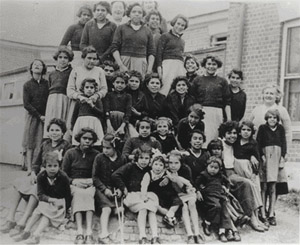|
Intermix.org.uk is a website for the benefit
of mixed-race families, individuals and anyone who feels they have a multiracial
identity and want to join us. Our mission is to offer a view of the mixed-race experience, highlighting icons, film, books, poetry, parenting techniques, celebrities, real lives and much more. Our online forums are a great place to meet others, ask questions, voice your opinions and keep in touch. Sign up for our monthly newsletter and delve into our pages. Want to join in? Become an Intermix member to take part: |
What About Reparations?
 New Australian prime minister says ‘Sorry’
New Australian prime minister says ‘Sorry’
The apology of Australia’s Prime Minister Kevin Rudd on Feb. 13 for the racist treatment inflicted on the country’s Aboriginal people was long overdue. For the first time, a prime minister used the word 'sorry,' even though Sorry Day has been a national event since May 26, 1998.
However, for all of Rudd’s repeated 'sorries,' the government is still refusing to pay compensation to people who lost their families, their languages and their way of life.
Rudd’s speech, which was the first order of parliamentary business for his new Labor government, drew over 1 million Australians to stop work, stop classes and gather around large-screen televisions. A major poll released Feb. 18, after much intense discussion had taken place, reported that over two-thirds of all Australians supported Rudd’s apology.
The response of opposition spokesperson Brendan Nelson to Rudd’s apology was so shockingly racist and filled with lies that in many places people shouted him down with raised fists, turned their backs, or pulled the plugs on their televisions. The Sydney Sun-Herald, a major newspaper in Australia’s largest city, said that one opposition spokesperson’s comment “was plainly ridiculous.” The spokesperson had said that the previous prime minister, John Howard, had done more for Aboriginal people than any other Australian prime minister.
Rudd’s apology (www.pm.gov.au) singled out Aboriginal children taken from their families, known as the 'stolen generation.'
The 2002 film Rabbit-Proof Fence, which follows three Aboriginal girls on a 1,300-mile trek through the Australian outback as they try to return home after being seized by government officials and taken away from their mothers, played a major role in building support for the “stolen generation.” The film was a dramatization of real-life people and events.
A government report issued in 1997 revealed that, between 1885 and 1967, 30 percent to 50 percent of all Aboriginal children had been taken from their families by government agents. The numbers reported range from 70,000 to 100,000.
Australia stated its position clearly at a Commonwealth conference in 1937, “The destiny of the natives of Aboriginal origin, but not of the full blood, lies in their ultimate absorption.” It restated its views in 1951, 'The aim is assimilation ... until the Aborigines live like any white Australian.'
Most of the children had white fathers and Aboriginal mothers. 'Chief Protectors' were appointed by each of Australia’s six states to become the legal guardians of these children. The openly racist content of their reports clearly indicates the genocidal intent of Australia’s legal system. Said Inspector James Idell in 1905: 'I would not hesitate for one moment to separate any half-caste from its Aboriginal mother, no matter how frantic her momentary grief might be at the time. They soon forget their offspring.' And Chief Protector Cook, 1911, 'Children are removed from the evil influence of the Aboriginal camp, with its lack of moral training and its risk of serious organic infectious disease.' [Le Monde Diplomatique (Eng.), Oct. 2000]
The children were supposed to be put in “charitable” institutions. Faye Lynam, an Aboriginal from Shepparton in northern Victoria, who was mentioned by name in Nelson’s speech—which she called 'toxic'—told the Sydney Morning Herald: 'My dad was not happy that I was taken. They cheated us, they cheated me of my life with him and now I feel like I’m stolen all over again. I am ashamed that he [Nelson] has done this to me, I’m so ashamed.'
She went on, 'When I went for a so-called better life, I was sexually assaulted, used as a little slave.' She managed to return to her father at age 16, after living in several foster homes.
Not just stolen, oppressed in many ways
Statistics make it clear how tough life is for Aboriginals compared to white Australians. Their life expectancy is 17 years less, infant mortality is four times higher, unemployment three times higher, average income less than a half, imprisonment and suicide rates five times higher. Alcoholism and gas sniffing are rampant, so common that they constitute a slow suicide for whole communities.
Just after his speech, Rudd’s Labor Party announced a four-year, $58-million plan to hire 200 teachers for isolated Northern outback communities, where many people speak their own languages rather than English, illiteracy is high and many schools are without teachers.
Under a 1992 High Court ruling, enshrining the Mabo Act, these Northern communities have title to a large swath of land that is possibly rich in minerals. The Mabo case was the first recognition of Native Title, a right of ownership for the Aboriginal communities living on the land.
Eddie Mabo was a Torres Strait Islander, a group that is culturally akin to the people living in Papua New Guinea and is distinct from the other Aboriginal groups in Australia. Mabo proved that his forebears had always lived on the lands he was claiming.
The Aboriginal people have occupied Australia for over 40,000 years and survived over 200 years of genocidal attacks from England and its colonizers. They deserve not only an apology but reparations to make them and their communities whole, safe and prosperous.
Watch the apology here:
Click here for more on Doris Pilkington Nugi Garimara
Related Article: Mixed-Race Film Rabbit-Proof Fence
Source:Articles copyright 1995-2007 Workers World.
